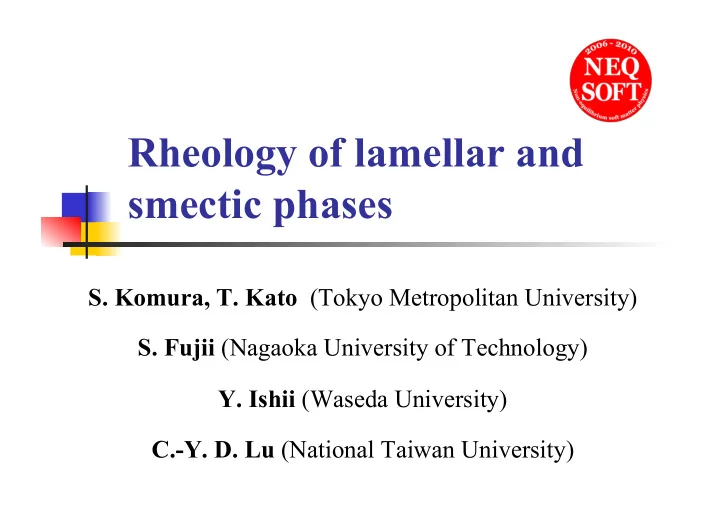

Rheology of lamellar and smectic phases S. Komura, T. Kato (Tokyo Metropolitan University) S. Fujii (Nagaoka University of Technology) Y. Ishii (Waseda University) C.-Y. D. Lu (National Taiwan University)
Outline Background Rheology of lamellar phase Rheology of smectic phase close to transition point Summary
1D layered structures 1D solid + 2D fluid Thermotropic smectic phases (Sm A, Sm C) Lyotropic lamellar phases ( L α , L β ) surfactant hydrophilic hydrophobic thermotropic lyotropic smectic phases lamellar phases
Elastic energy de Gennes (1969) Layer displacement field: Elastic energy density: 2 f = K 2 u ) 2 + B ∂ u 2 ( ∇ ⊥ 2 ∂ z K : bending constant
Shear thinning behavior of smectic phases: universality? Yamamoto, Tanaka (1995) Meyer, Asnacios, Kleman (2001) C12E5 shear thinning
Outline Background Rheology of lamellar phase Rheology of smectic phase close to transition point Summary
Dislocation loops in lamellar phases Dissipation due to motion of dislocations edge screw
Lu et al . (2008) Dynamics of dislocation loops Steady state stress: σ ~ ρ s τ e ρ s :screw density τ e : edge line tension Birth and sink of dislocations: ∂ ρ s ξ ∂ t = (˙ γ / bl e ) − (˙ γ l s / ξ ) ρ s Steady state: Stress scaling:
Strey et al . (1990) Phase diagram of C12E5 Concentration: Temperature: 30~45 wt% 66~71 ℃ (339~344K) sponge Newtonian lamellar Snabre, Porte (1990)
Flow curves Lu et al . (2008)
Temperature effect
Concentration effect MAK our theory
Outline Background Rheology of lamellar phase Rheology of smectic phase close to transition point Summary
Thermotropic LC: 8CB 4-n-alkyl-4’-cyano-bipheny (8CB) ~ 2nm 33.4 ℃ 40.5 ℃ smectic nematic isotropic
Rheology of 8CB Panizza, Archambault, Roux (1995) Colby et al . (1997) 31 ℃ 26 ℃ m = 2 Universality ?
Helfrich (1978) Nelson, Toner (1981) Smectic-Nematic transition Dislocation loop-mediated smectic melting Dislocation unbinding transition Free energy of a loop: F = τ − k B T ( / b )ln p τ : line energy p : coordination number τ b Transition temperature: T SN = k B ln( p ) Divergence of defect size
Fujii et al . (2010) Flow curves of 8CB T SN =33.4 ℃
Three different regimes Regime 0: Hurschel- T =33.1 ℃ Bulkely model n σ = σ y + A ˙ γ Regime I: power law behavior 1/ m σ = C ˙ γ Regime II: Newtonian
Obtained parameters Regime 0 Regime I
Microscope observation T =25 ℃ T =29 ℃ T =31 ℃ a b c γ = 1s -1 ˙ Focal Conic f d e Domains T =33 ℃ γ = 0.1s -1 1s -1 10s -1 ˙
Horn, Kleman (1978) Yield stress Fujii et al . (2010) Network of focal conic domains with size L Needed stress to deform network σ y ≈ K / L 2 Constant K Unbinding behavior?
High shear stress region heating rate=0.05K/min
Fujii et al . (2010) Dynamic phase diagram + perpendicular leek? cf. Safinya, Sirota, Plano (1991)
Viscoelasticity of 8CB T = 25 ℃ T = 29 ℃ T = 31 ℃ T = 33 ℃
Scaling of G’ with L Relation between G ’ and FCD size G '~ 1/ L Effective surface tension σ eff ~ KB Similarity to onion phases
Summary Defect mediated rheology in lamellar and smectic phases (structural rheology) Lyotropic lamellar phase motion of dislocation loops Thermotropic smectic phase close to T SN growth of FCD effective surface tension
References C.-Y. D. Lu, P. Chen, Y. Ishii, S. Komura, and T. Kato, Eur. Phys. J. E 25 , 91-101 (2008). S. Fujii, Y. Ishii, S. Komura, and C.-Y. D. Lu, Europhys. Lett. 90 , 64001 (2010).
Recommend
More recommend